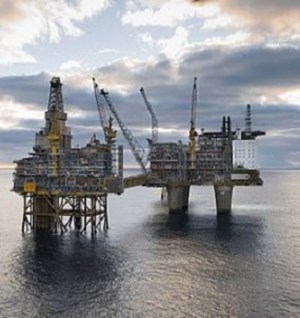At oil industry's big summit, uncomfortable truths creep in
LONDON (Bloomberg) -- Right from the start of London’s biggest gathering of oil traders and producers, uncomfortable truths began to intrude upon the usual round of business meetings and cocktail parties.
Three climate-change protesters who glued their hands to the doors of the conference venue found that nature was making their point for them. “Why is it so warm?” one shouted to people walking in off streets that were basking in a record winter heat wave, which was causing wildfires in the north of the country.
The protest outside the InterContinental hotel on Wednesday highlighted the oil industry’s existential crisis. It is under increasing pressure to course correct and align itself to the demands of the energy transition. While Big Oil is no stranger to demonstrations at conferences, CEOs are finally acknowledging they face real consequences to their ability to retain shareholders if they don’t respond.
“We are facing a crisis of perception,” Saudi Aramco CEO Amin Nasser told the hundreds of assembled delegates when the conference opened on Tuesday. It could “put our ability to supply reliable and affordable energies at risk,” he said.
Even acknowledging the problem has been an excruciating process. Now that they have, they’re undertaking the big challenge of regaining trust. Royal Dutch Shell Plc CEO Ben van Beurden has said the industry needs to retain its “societal license” to keep operating profitably in the future.
The biggest companies have started making their moves. Total SA’s portfolio could be half natural gas, a third oil and the rest low-carbon electricity by 2040, upstream chief Arnaud Breuillac said. The company said Tuesday it’s acquiring renewable-power producer NovEnergia.
Shell and BP Plc have also bought clean-energy companies and invested in electric-vehicle infrastructure and power utilities. Aramco, the world’s biggest oil producer, now aims to become a world leader in gas, Nasser said.
Still, the companies’ primary business is oil, which helps sustain profits and makes them some of the biggest dividend payers in the world. Their clean-energy investments make up only a small portion of the tens of billions of dollars they spend on finding and producing crude oil, turning it into fuels and selling to it consumers around the world.
Company New Energy capex in 2020 New Energy capex/Total capex Shell $1.5 billion 5% Total $480 million 3% BP $500 million 3% Eni EU300 million 4% Equinor $750 million 6% Source: JPMorgan Chase & Co. data from Sept. 2018
In between touting their approach to climate change, there was vociferous defense of fossil fuels by speakers at IP Week. Renewable power generation is still intermittent and can only serve a portion of the world’s energy needs, and the best way to lift people out of poverty is access to cheap and reliable energy, they said.
Emission targets
Some of the companies have implemented carbon-emission reduction targets, mostly focused on their own operations. The drillers, who for years have been criticized for contributing to pollution, are hoping those efforts at being greener attract bright, young students to the industry. If that doesn’t entice them, executives talk about the strides they are making in technology.
“This sector is tech. We need to say: ‘We are tech,”’ said BP Upstream CEO Bernard Looney. “I asked a young employee ‘What is it that’s cool about working at BP?’ He said one is that computing horsepower that is available to somebody like him.”
While the world will continue to depend on oil for decades to come, it’s unlikely the companies will have an easy time of it as protests become louder. Voices of the demonstrators outside London’s InterContinental Hotel could be heard by IP Week delegates who had paid 2,000 pounds ($2,661) each to attend.
Not a single executive came out to talk to them, said Roman Paluch, a member of the protest group, Extinction Rebellion. He jutted a finger toward the white screens the hotel staff had put up to cover the three men glued to the doors from the sight of passers-by.
“People in there are kind of um’ing and ah’ing because they can’t figure out whether this is going to affect them or not. Meanwhile, it’s happening all around them,” said William Skeaping, another Extinction Rebellion member. “It’s just tragic.”



